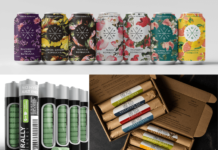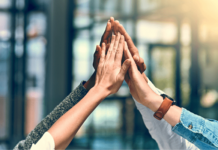
Subscribe: Apple Podcasts | Google Podcasts | Spotify | Email | TuneIn | RSS | More
In Edible-Alpha® podcast #102, Brad chats with Michelle Goetsch, founder, and CEO of Betterbin, a data company that empowers consumers and brands to recycle and compost CPG packaging properly. An alumna of the Wisconsin FFI FaBcap Accelerator, Michelle details her journey of bringing an app to market, building a viable business, and laying the foundation for future growth.
Betterbin was born in 2018 out of a pain point. As a consumer passionate about environmental responsibility, Michelle was frustrated by how difficult it can be to determine packaging recyclability or compostability since the rules are different everywhere. “You can Google anything, so why was it so hard for me to recycle properly in my community?” she says. “I thought there has to be a way to use data to solve this problem.”
There was a way—Michelle just had to invent it. Knowing that CPG manufacturers and brands catalog their product specs digitally, “I realized there is nothing stopping us from leveraging that infrastructure of data that already exists to help people know what to do with waste.”
Betterbin’s first product, a consumer-facing app, does exactly that, powered by proprietary machine-learning technology. Users simply scan a product barcode or snap a photo, and the app identifies the packaging materials, cross-references that data with local recycling and composting guidelines, and spits out disposal instructions. Users are then rewarded with points and gift cards.
But a whole lot went into getting the product to market. Michelle first consulted with multiple stakeholders in the materials recovery sector to better understand the scope of this issue. Learning it was indeed massive and complex, she wrote a grant for her app idea and partnered with a data scientist to build it. Then, with financial help from several Wisconsin communities, Betterbin launched pilot projects nationwide.
The COVID-19 pandemic paused the pilots, which was a blessing in disguise. “It gave us a moment, when things were moving so fast, to reflect on what our product was and what our goals were,” Michelle says. That’s also right when Betterbin got accepted to the Plug and Play Sustainability Accelerator in Silicon Valley, introducing the team to mentors, investors, and other support, and connecting them with CPG brands to learn their pain points.
Currently, the app has about 2,500 users, and Betterbin is now talking with brands, municipalities, and larger systems players about how to scale. The company is exploring various B2B2C business models, such as selling to property managers and Airbnb hosts, who can offer their tenants the app for free.
Moving forward, Michelle expects policy decisions to be a big growth driver, as state legislatures start cracking down on allowable on-pack recycling and composting claims. Such policies should push more brands toward Betterbin since the app gives them an easy way to disseminate localized disposal instructions—as opposed to designing 20 different labels for 20 different markets. Additionally, the app collects unique consumer-use data that can further benefit brands, so monetizing that intel will be Betterbin’s main focus in the future.
Brad and Michelle conclude by discussing the nuances of launching a tech company as compared to CPG, including the level of collaboration required. Tech also needs different capital than CPG, and Michelle says it has been crucial to work with investors that understand Betterbin’s growth arc, performance metrics, and sustainability mission. She stresses the importance of networking, accelerator programs, and keeping an even keel through the highs and lows of entrepreneurship.



